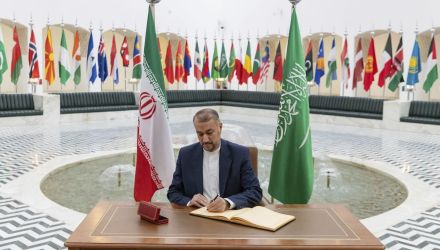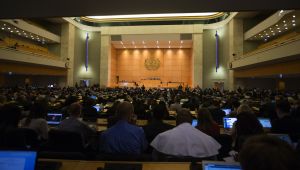Count the Iran nuclear deal as a rare win for President Obama’s secretive, cerebral style of governing. His careful, closeted approach has produced many setbacks over the past five years, but it was at the heart of last weekend’s breakthrough deal with Tehran.
This was secret diplomacy that a Henry Kissinger could appreciate. Obama began by authorizing carefully concealed meetings back in March, through Oman, the most opaque and discreet nation in the Persian Gulf. The president sent as his personal emissaries two low-key, quintessentially gray men, Bill Burns and Jake Sullivan, the deputy secretary of state and vice presidential adviser, respectively.
It was a classic magic trick: While the eye was distracted by the show of the P5+1 talks, the real work was done elsewhere — and presented to the foreign ministers of Russia, China, Britain, France and Germany in Geneva two weeks ago almost as a fait accompli.
No wonder Israeli Prime Minister Benjamin Netanyahu and French Foreign Minister Laurent Fabius were miffed. This deal was done (as any serious piece of diplomacy must be) out of sight. They were asked to endorse it after the fact, and it’s no surprise that they balked — Netanyahu unwisely locking himself into an inflexible rejectionist position and Fabius dickering publicly for more concessions.
Commentaries along the way celebrated Fabius’s show of independence, just as earlier reports had lauded Russian diplomacy on Syria. But this credit was largely illusory. Iran and Syria illustrate the immense leverage the United States still has when it uses its diplomatic tools wisely and stealthily.
The definition of a good agreement is one that each side can sell to its public, and that’s the case here. The agreement seems broadly positive for the United States and Israel, at the outer edge of what was possible in terms of freezing the Iranian nuclear program and providing daily inspections to check against any trickery. The world is safer from the Iranian nuclear threat today than it was a week ago.
But it’s a good deal for Iran, too, and that’s going to upset those who wanted an Iranian capitulation. The agreement explicitly seeks a “comprehensive solution [that] would enable Iran to fully enjoy its right to nuclear energy for peaceful purposes under the relevant articles of the NPT [Nuclear Non-Proliferation Treaty],” including “a mutually defined [uranium] enrichment program.” The language is just fuzzy enough that the United States can claim it hasn’t endorsed a “right to enrich” — but the Israeli critique here is correct. The enrichment right has prospectively been conceded; it will never be rescinded, nor will it ever again form the basis for a U.N. Security Council resolution condemning Iran.
This big concession on enrichment is offset by the limitations on the Iranian program in the near term that are stronger than many analysts expected. For the next six months, the Iranians will mothball some centrifuges, delay installation of others, disconnect links between the cascades of centrifuges that would be necessary for bomb-level enrichment and provide unprecedented daily inspection of their once-covert facilities at Natanz and Fordow.
Could the Iranians pocket the modest $7 billion they will receive in sanctions relief and then press ahead in six months toward bomb-making capability? That’s certainly possible. But they would make such a breakout with more chance of a U.S. military strike than before.
Kissinger set the right test when he told me in 2006 that “Iran has to take a decision whether it wants to be a nation or a cause.” This agreement, negotiated in secret with the erstwhile “Great Satan,” looks like the beginning of a long turn away from revolutionary isolation to an Iranian nation that is engaged with the West in a security framework for this volatile region. Iran may think it can play the candle at both ends — destabilize the region even as it negotiates with the United States. But that isn’t likely to work. This is a fork in the road; Iran may try to go both directions at once, but if the United States and Israel are vigilant, it won’t succeed.
The deal reached last weekend is fragile. It can be reversed; it can be finagled at the edges; it can mask secret activities. In most agreements, the rubric is “trust but verify.” In this case, make it mistrust and verify.
But it’s a beginning of a process that could make the world less dangerous. Obama, the covert commander in chief, showed once again that he acts most effectively out of sight.
Ignatius, David. “To Reach Iran Deal, Secret Diplomacy That Worked.” The Washington Post, November 25, 2013




